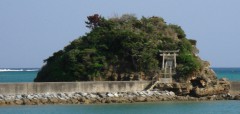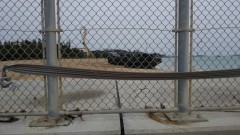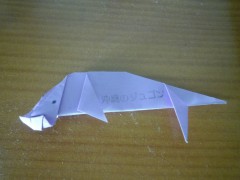31 July 2014
Puff the magic dragon, lived by the sea, in the land called "HENOKO"
I saw the dragon there, in Henoko, Okinawa prefecture, southernmost chain of the islands in Japan.
You might not believe that. This is the proof.
Yes, it looked like rainbow. But the sea is known to be sacred place for the dragon. The locals worship it and established a shrine on the sea coast.
Recently the dragon seems not very comfortable living there because of construction project going on his or her place. On the sea coast is US Marine training camp base, Camp Schwab. There is a plan to expand the base by reclaiming the sea where he/she lives.
The locals oppose the plan because their environment would be deteriorated as well. However, US military and the Japanese government never mind local resisitance movement.
Will he/she leave as the things are? I doubt it.
The sea reminds me of what I experienced 3 years ago in Kaminoseki, Yamaguchi prefecture in the mainland of Japan. Actually I learnt about that town when I joined environment activists meeting in Henoko. I met Kaminoseki activists who protest the construction project that reclaims the sea to build nuclear power plants there. They did the same things as locals in Henoko do, kayaking the sea to prevent construction work from proceeding.
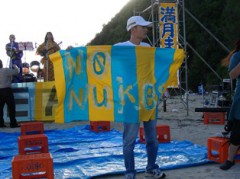
So I visited Kaminoseki later. There I saw the same scene.
Activists on the beach calling for the halt of the project but the authorities and power company never minded their voices. The project was about to be proceeded and the beach might be destroyed sooner.
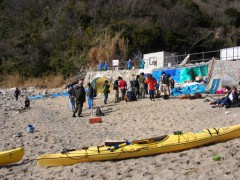
I felt something when I was on the beach. I sympathized, and then prayed to call for the help.
Two weeks later a big earthquake and tsunami occurred in Fukushima. 4 nuke plants were destroyed by the nature and massive radioactives were released to the environment.
Now the construction is halted in Kaminoseki (not yet terminated.) No nuke plants are operated in Japan at present.
In that town, there enshrined the sea dragon.
Was it just an coincident? I just don’t think so. That is why I’ve been feeling fear.
20:06 Posted in Ecology, Japan News, Music, Travel, US-Japan relationship | Permalink | Comments (0) | Tags: military, okinawa, nuclear power
16 February 2014
Dear Madame Ambassador Kennedy, Re: Okinawa Issue
Surprising thing happened in Okinawa. US Ambassador to Japan met with mayor of Nago city and visited the controversial construction site for new US Marine base.
Maybe because she responded to the below editorials of local newspapers.
EDITORIAL [Dear Madame Ambassador Kennedy] Please Meet with Mayor Inamine
However, I wrote the letter to her. That might have worked as well, I guess.
The below is what I wrote to her early this month and is a progressed version of a letter I wrote to her last November.

February 3, 2014
My name is Masagata, a Japanese man living in Tokyo. I used to study at San Francisco State University, where I majored in International Relations. I am now working as a translator using the English knowledge I acquired in the US.
I am writing this letter to tell you about a matter that is very important to both of our nations. I am sure that you are well aware of many issues between the two nations. I would like to mention the most important of these: a matter that might result in long-term deterioration of the current healthy relationship between the two nations. I urge your government to rethink its ways of dealing with this issue.
The matter in question is the relocation of the US Marine Base from Futenma in Ginowan City, Okinawa Prefecture, Japan’s southernmost tropical islands, which are a little like Hawaii. In 1996 both the American and Japanese governments agreed to relocate Futenma base to Camp Schwab to get away from the densely populated area around Futenma. Camp Schwab is on the coastline of the island, in an area called Henoko.
There has been a local resistance movement since the relocation plan was announced. Locals near Camp Schwab are concerned about the deterioration of their living environment. Many environmental activists also oppose the plan because of the abundance of forms of wildlife that are unique to the area around Camp Schwab.
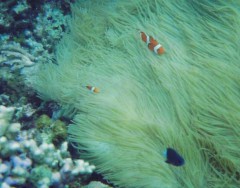
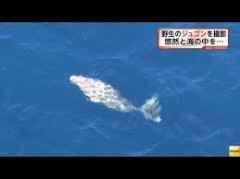
I took the photo of one of the above when scuba diving in the nearby sea. It shows clown fish swimming above the coral reef like in the film “Finding Nemo”. The other photo is of a dugong, an endangered marine mammal that eats grasses in the sea. I enclosed purple paper craft of dugong made by locals.
It is just ridiculous that the nation that protests Japan’s whaling in the Antarctic Sea – and even dolphin hunting in Taiji, Wakayama Prefecture – is helping to threaten another marine mammals that live in Japan.
On November 22nd, 2013, in Nago City (to which Camp Schwab is attached), the city council made a resolution demanding the Okinawa Governor not to permit landfilling of the sea. However, the governor permitted the landfill in December even though a majority of Okinawans disapproved his decision.
The following month, in January, Okinawa Prefectural Council made a resolution demanding the Governor’s resignation. Okinawan protest activists announced legal action against the prefectural government in order to cancel the permit. Later, on January 19th, the mayor of Nago City, INAMINE Susumi, was re-elected because of public support for his policy of the city’s refusing corporation with central and US governments regarding construction of the new base project.
If the project is implemented as planned, the sea will be reclaimed and dugongs and other creatures’ lives would be threatened. Dugongs’ sea grass is found in the reclaiming area. They will lose their feeding place. Then what will happen is that your nation will be accused of helping to diminish such wonderful and rare creatures for the interests of the few. The few, you might know, are certain businesses and government people who want some gains from the project. Actually, the Japanese Ministry of Defense carried out an environmental assessment in which it was claimed that there are no dugongs in the sea. But the environmental organizations such as WWF and The Nature Conservation Society of Japan claim that the MoD’s assessment was wrong and the organizations’ own research found clear traces confirming the existence of dugongs. Recently, Okinawa’s local newspaper revealed the news that the MoD was aware of the finding but had covered it up.
You might say this is something to be handled by the Japanese government, and that it is not the responsibility of the US military. But that sounds very hypocritical. The US military is the one that uses the facility. The US government can cancel that project and find another relocation site outside Okinawa. If the US continues to attribute this to the Japanese government, it is just like what Japanese conservative politicians say when it comes to the “Comfort Women” issue: “The Japanese Imperial Army was not responsible for kidnapping women in Asia during the war period in the early 20th century, it was what outsourced local brothels did.”
There may be casualties and incidents resulting in bloodshed during protest activity against construction. Such news will be broadcast all over Japan. The construction will take several years to complete. Resentment will continue to build. Your military and diplomats will have to deal with such problems for a very long time.
In fact, the US military presence in Okinawa and even nationwide is becoming nothing but troublesome. More of us know that the US military presence no longer functions as defense or deterrence like in the Cold War era. China is said to be a new threat but we know that US-China relations have become more vital for your nation since China owns more US treasury bonds and buys more US goods than Japan does. China has become a larger economy than Japan these days. President Obama spends more time having dialogues with Chinese leaders than with the Japanese Prime Minister.
Plus, US needs China for negotiation with North Korea in terms of nuclear missile issue.
Recent incidents indicate US reluctance to defend Japan from China. In 2010 a Chinese fishing ship collided with Japan’s coast guard ship in the sea near the Senkaku Islands, a disputed territory between Japan and China. The captain of the ship was arrested by the coast guard. The US Secretary of State said it would have no involvement in this matter and the captain was later released. Last year China announced expansion of its Air Defense Identification Zone to the Okinawa area. Japan objected to it and demanded China to cancel the expansion, but the US did not follow what Japan did to China but requested US private airliners to submit flight plans in that zone to the Chinese authorities, precisely opposite to the Japanese stance.
We can easily predict that the US would not help Japan even if China and Japan became involved in a dispute for some reason such as the territorial right to the Senkaku islands. The US cannot send troops to assist Japan fighting against the Chinese military because such action might cause great losses for your national interests. China has many ways to sanction your nation.
Military experts say that the biggest reason that the US military forces stay in Japan is to cut cost of their own because Japan provides host nation support fund, which we call “Sympathy Budget” that accounts for more than 70% of total expense for the US bases in Japan. There are more than 130 facilities of US military in Japan. Most of the troops are stationed in Okinawa prefecture that accounts for less than 1 % of total of Japan’s territory. Okinawa has been occupied until 1972, which is 20 years after mainland Japan regained sovereignty and was the only place that experienced ground battles within Japan, causing 200,000 civilian casualties during WW II.
Deploying your military so much in our country, especially Okinawa is just causing growing distrust against your country. I believe the Okinawa issue presents the perfect timing for your nation to rethink its military deployment in Japan in order to improve the relationship between the two nations. Constructing a base on reclaimed land in the Henoko sea is the worst possible idea.
US military presence functions to apply American influence on our nation. Yes, it did work that way but you really have to know this may be working negatively. The image of your country itself is no longer positive like in the past. In other words, the US is no longer a powerful land of dreams, nor is it any longer a role model for us. One example of this can be seen in a recent best-selling book on your country’s poverty issue. The title of the book is “Hinkontaikoku America” (Poverty Superpower, America). It was written by a Japanese journalist, TSUTSUMI Mika. The book describes how Americans are struggling with poverty in a plutonomy society and explains how Japan should not follow suit.
We know that a lot of young Marine troops stationed there come from poor families that cannot afford college education and have problems like domestic violence. They join the Marines by system, so called, Poverty Draft. That is why they cause troubles with Okinawa locals.
The interesting thing to note is that Japan was democratized and the wealth of the nation was redistributed from pre-war plutonomy by the US occupying forces. Thanks to them, Japan has become the most egalitarian society among industrialized nations. We do appreciate that. We are always good friends to you as long as you are what you should be. So please keep being a good friend to Japan.
Below is a photo of me, taken in Washington 20 years ago when I was attending university. I remember some of my classmates told me that I looked like JFK when I made a presentation on his foreign policy. I have many wonderful memories from the time I spent over there. People were very friendly and kind to me. I do not want to feel betrayed any longer.
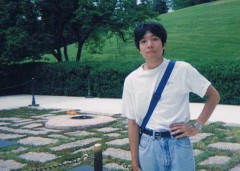
Sincerely,
I hope that she saw the scenery like that over there.
23:22 Posted in Ecology, Japan News, Politics, US-Japan relationship | Permalink | Comments (0) | Tags: okinawa, military, dugong, jfk
23 January 2014
US Ambassador to Japan, Caroline Kennedy's Double Standard
Last Monday, US Ambassadar to Japan, Caroline B. Kennedy wrote the below comment on her twitter page.
"Deeply concerned by inhumaneness of drive hunt dolphin killing. USG opposes drive hunt fisheries."
I guess she was impressed by the documentary film "The Cove" which describes brutality of dolphin hunting in Taiji town in Mie Prefecture.
Whether her remark is right or wrong, it is double standard. So I replied to her as below.
"Double standard! Saving dolphins in Taiji and killing dugongs for new Marine base (construction) in Okinawa at the same time."
If you want to know why I wrote that. Read the posts with Okinawa tag on this blog or the below newspaper article.
Dugong plaintiffs consider new action in U.S. to block Henoko landfill
We are sick of America's hypocrisy.
02:14 Posted in Ecology, Politics, US-Japan relationship, USA issues | Permalink | Comments (0) | Tags: okinawa, military
27 November 2013
Dear US Ambassador to Japan, Caroline Bouvier Kennedy
The following is what I wrote to newly appointed US ambassador to Japan.

---------------------------------------------------------------------------------------
My name is Masagata, Japanese man living in Tokyo.
I used to study at San Francisco State University. My major was International Relations. I am now working as a translator using English knowledge I gained there.
I am writing this letter to tell you a very important matter for the both nations. I am very sure that you know many issues between the two nations. I would like to mention the most important one that might severely deteriorate current healthy relationship between the two for a very long period of time.
That is relocation of US Marine Base, Futenma in Ginowan city, Okinawa prefecture, the Southernmost tropical islands like Hawaii. In 1996 both US and Japanese governments agreed to relocate Futenma base to Camp Schwab to get away from populated area. Camp Schwab is on coastal line of the island. The area is called Henoko.
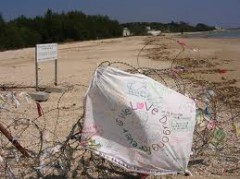
There has been local resistance movement since the relocation plan was announced. Localies near the Camp Schwab are concerned about deteriorating of their living environment. A lot of environmental activists oppose the plan as well because of abundance of wild life, which are very unique, only found in that place. One symbolic creature is dugongs, endangered marine mammals that eat sea grasses in that area. It is just strange that the nation that protests Japan’s whaling is helping another marine mammals endangered. Some activists are planning to take legal action against US government regarding this issue. Please read the enclosed newspaper article titled, Dugong plaintiffs consider new action in U.S. to block Henoko landfill.
If the project is implemented as planned, the sea will be reclaimed and dugongs and other creatures’ lives would be threatened. What will happen is your nation will be accused of helping diminishing of such wonderful and rare creatures for the interests of the few. The few, you might know, some business and government people who want some gains.
You might say it is what Japanese government handles, not what the US military is actively involved. No one in Japan thinks so. The US government can cancel that project and find another relocation site outside Okinawa. In fact US military presence in Okinawa and even nationwide is becoming nothing but troublesome.
More of us know US military presence no longer functions as defense or deterrence like in the Cold War era. China is said to be new threat but we know US-China relation has become more vital for your nation since China owns more US treasury bonds and buys more US goods than Japan does. President Obama spends more time having dialogues with Chinese leaders than with Japanese prime minister. We can easily predict the US would not help Japan even if China and Japan get into dispute for some reason. US cannot send troops to assist Japan because such action might cause great loss for your national interest.
Deploying your military so much in this country is just causing distrust against your country. I believe Okinawa issue arising is a great timing for your nation to rethink military deployment in Japan to better relationship between the two nations.
Sincerely,
------------------------------------------------------
I am planning to write more detailed version of the above later on adding some progress regarding Okinawa issues.
11:03 Posted in Ecology, Japan News, Politics, US-Japan relationship | Permalink | Comments (0) | Tags: okinawa, military







